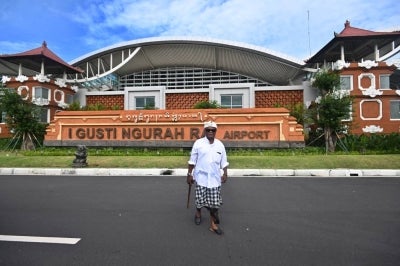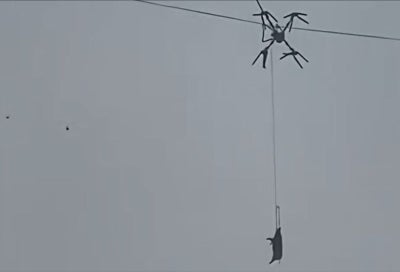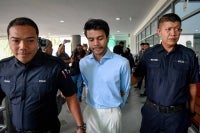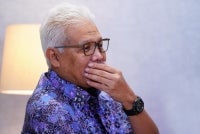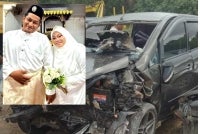First foreigners, wounded set to leave devastated Gaza

GAZA - Hundreds of wounded Gaza residents and foreigners gathered at the Egypt border Wednesday, poised to flee the shattered territory that is still reeling from a deadly Israeli strike on a refugee camp.
AFP images showed long lines of ambulances and several people in wheelchairs at the Rafah border crossing -- the only one not controlled by Israel -- after Cairo said it would let in 81 of the most seriously injured.
Egypt also announced the first foreigners could exit Gaza, which has suffered weeks of relentless bombardment by Israel that has cost the lives of more than 8,500 people, including more than 3,500 children, according to the Hamas-run health ministry.
AFP reporters saw more tanks pour over the border into northern Gaza, as Israel stepped up its ground incursion.
An Israeli strike on Gaza's largest refugee camp killed at least 47 people Tuesday, including, Israel said, a Hamas commander.
A large explosion ripped through the densely packed Jabalia camp before nightfall, tearing facades off nearby buildings and leaving a deep, debris-littered crater.
Wails filled the air as hundreds of bystanders and volunteers clawed at concrete blocks and twisted metal looking for survivors.
AFP witnessed at least 47 corpses being recovered.
Horrified resident Ragheb Aqal, 41, likened the explosion to "an earthquake" and spoke of seeing "homes buried under the rubble and body parts and martyrs and wounded in huge numbers".
Israel said its warplanes had struck a "vast" tunnel complex at the site, killing "many Hamas terrorists", including local battalion commander Ibrahim Biari.
Military spokesman Jonathan Conricus described Biari as "pivotal in the planning and execution" of the raids by Hamas, that Israel has vowed to "crush" in retribution.
Gaza's Hamas-run health ministry denounced the incident as "a heinous Israeli massacre" and said an initial toll of 50 dead and 150 wounded was sure to rise.
Tuesday's strike sparked more international condemnation, with Bolivia announcing it was cutting ties.
And Qatar warned that expanded strikes would "undermine mediation and de-escalation efforts".
Doha hosts several senior Hamas officials and is a key channel in trying to secure the release of some 240 hostages believed to have been taken by Palestinian fighters on October 7.
Saudi Arabia also criticised the strike, with its foreign ministry issuing a statement saying it condemned "in the strongest terms possible the inhumane targeting by the Israeli occupation forces of the Jabalia refugee camp".
But there is little sign of the conflict abating.
As the aerial war continued, Israel said nine soldiers were killed as troops engaged in "fierce battles" with Hamas fighters"deep inside the Gaza Strip" on Tuesday.
Hamas's armed wing, the Ezzedine al-Qassam Brigades, has vowed to turn Gaza into a "graveyard" for invading forces.
- No ceasefire - Aid groups and the United Nations warned time is running out for many of the territory's 2.4 million people denied access to food, water, fuel and medicine.
Surgeons are conducting amputations on hospital floors without anaesthetic, and children are forced to drink salty water, said Jean-Francois Corty, vice-president of Medecins du Monde, which has 20 staff on the ground.
The Palestinian telecommunications agency said Wednesday that phone and internet services had "been completely cut off in Gaza", the second such blackout in a week.
Israeli Prime Minister Benjamin Netanyahu has dismissed international calls for a humanitarian ceasefire.
He said they amount to "a call for Israel to surrender to Hamas, to surrender to terrorism, to surrender to barbarism".
"This will not happen," he said.
Israeli officials said that 70 trucks with aid were allowed to enter Gaza from Egypt on Tuesday.
That is one of the biggest flows since a US-brokered deal was reached, but much less than humanitarian groups say is needed.
Israel fears that food, water, and medicine coming into Gaza could be diverted to Hamas, or that aid shipments could conceal arms or other supplies.
As a result, Israeli security personnel carry out stringent inspections that have slowed the flow of aid to a trickle.
As Israel steps up its assault on Gaza, the families of hostages are struggling with an unbearable wait for news of relatives thought to be held in the labyrinth of tunnels deep below Gaza.
"It's really hell. There are no words to express this," said Hadas Kalderon as she walked past the blackened homes of kibbutz Nir Oz.
There gunmen killed her mother and niece and kidnapped her 12-year-old son and 16-year-old daughter.
"I don't have any control and knowledge about army actions, I just know my children are still there in the middle of a war," said the 56-year-old.
Yemen's Huthi said they had "launched a large batch of ballistic missiles... and a large number of armed aircraft" towards Israel on Tuesday - AFP
Download Sinar Daily application.Click Here!



